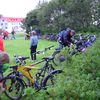4.5.2007 | 13:06
"The transport elephant in the climate change room"
Sendi þetta á fjölmiðla í gærkvöldi :
SUSTRANS : The transport elephant in the climate change room
Tæknilausnir duga ekki einar til að leysa loftslagsmálum, segir Sustrans.
Hagrænir hvatar þurfa til, og fjármagnið sem þannig fæst ætti að nota í að
styrkja heilbrigðar samgöngur.
IPCC, Vísindanefnd SÞ í Lofslagsmálum, leggja um þessar mundir lokahönd á
skýrslu um aðgerðir,
en hafa enn ekki séð ljósið.
Vil líka benda á áhugaverða skýrslu þar sem reiknað er á hversu mikið
mætti spara í heilsukerfinu ef allir mundu hreyfa sér til samgangna 30
mínútur á dag, eða jafn mikið og WHO mæli með sem lágmark. Peningin sem
sparast í heilsukerfinu mætti nota í hreinni lausnir og mnnka útblástur
enn frekar. Óraunhæft, í bíli já, en þetta gefur ákveðna mynd.
Exercise-based transportation reduces oil dependence, carbon emissions and
obesity
http://journals.cambridge.org/production/action/cjoGetFulltext?fulltextid=370343
http://www.ecf.com/2328_1
http://www.sustrans.org.uk/default.asp?sID=1178201066515
03.05.2007The transport elephant in the climate change room
On the eve of the latest report from the Intergovernmental Panel on
Climate Change (IPCC) Sustrans, the UK's leading sustainable transport
charity, sets out its recommendations for low carbon travel. But, says the
charity, the techno fixes so beloved of government, and the IPCC itself,
are not the whole solution. What is also needed, and urgently, is a shift
in behaviour change, and real government commitment, to meet the IPCC's
recommendations and deliver the level of reduction in CO2 emissions needed
to avoid rising climatic temperatures.
Fossil-fuel generated CO2 emissions from transport are steadily growing
and this sector is now contributing more CO2 than any other in the UK(1).
Sustrans believes that the UK government should commit to keeping CO2
emissions within 450 parts per million, since this offers the best chance
of keeping the average increase in temperatures worldwide within 2 degrees
C. Transforming the travel culture is critical to achieving this, but
transport policy continues to focus on enabling people to travel further
faster, with tackling congestion rather than carbon emissions a key
priority.
Sustrans' own work shows that bringing about travel behaviour change can
be quick and, if properly conducted, uncontroversial and economical,
particularly for short journeys normally made by car. And, where people
are choosing to walk or cycle, there are accompanying health benefits with
a reduced burden on the NHS.
Sustrans' behaviour change work graphically illustrates the potential for
change, its research on typical towns showing that around half of all car
trips could be replaced by walking, cycling and public transport with no
changes made to existing services and conditions. And there is a public
demand, around 90 per cent of people favour measures to improve conditions
for walking, cycling and public transport even when this disadvantages car
users(2).
Sustrans calls on governments to do much more to fund travel behaviour
change programmes that, the evidence shows, reduce car use by at least 10
per cent(3). In addition government has a real role to play in introducing
stronger fiscal measures such as increasing taxes which is known to be
effective in dampening demand, for example, increasing Vehicle Excise Duty
on less efficient vehicles. Another solution is road user charging focused
on reducing car use rather than congestion. The revenue generated should
be ploughed back into sustainable transport alternatives.
The IPCC report will focus on technological solutions to transport, such
as increased use of hydrogen fuel cells and biofuels. But serious doubts
exist about the ability of the biofuel industry to meet the demands of a
growing transport sector. Based on current predictions the biofuel
industry's hunger for land and water resources would quickly outstrip
supply, one study predicts the demand in the EU alone would need one
quarter of the EU's arable land to be turned over to biofuel production.
While the car industry has started to address the issue of fuel efficiency
current voluntary agreements with car manufacturers are running behind
schedule, with cars becoming less, not more, fuel efficient. Nearly a
century ago Ford's model T achieved 25 miles to the gallon, today many
Ford cars and trucks achieve much less than this. In short Sustrans
believes there is no technology available today that will enable the
transport sector to make sufficient cuts in emissions to achieve the UK's
own target of a 60% reduction by 2050, and that there needs to be much
greater focus on bringing about quick behaviour change.
Sustrans' recommendations are published in its Low Carbon Travel
information sheet. The sheet is introduced by Professor Sir John Lawton,
Chairman of the Royal Commission on Environmental Pollution, who
highlights the urgency for action: "The evidence is now stronger than ever
that technological improvements alone will not be enough to deliver the
scale of emissions reductions we need to see from the transport sector.
Behaviour change is vital, that means all of us traveling less far, in
more energy efficient ways and at slower speeds. Transport and planning
must be better integrated so that people can travel shorter distances to
work, shops and schools and resources should be switched from road
building to creating conditions that will encourage people to walk, cycle
and use public transport much more.
"Doing nothing is no longer an option, in 1994 the Royal Commission called
for environmentally sustainable transport - if my successors are making
similar calls in another 13 years time then it will be too late".
Peter Lipman, Sustrans' Director of Low Carbon Travel: "This latest IPCC
report is crucial because it suggests ways of mitigating climate change by
reducing our greenhouse gas emissions. It will inform the next stage of
the Kyoto protocol process, so if it focuses only on magic bullets that
have yet to be proven effective rather than on bringing about behaviour
change which we already know works, and works quickly, it will be a wasted
opportunity. In the UK it is time to have a proper debate about the issues
rather than pretend we can have unfettered growth in mobility. The
evidence suggests that when people are well informed about the impact of
their travel choices, they are very willing to change their behaviour to
more sustainable ways of getting around. We can no longer afford to avoid
this reality".
For more information on
This news : http://www.sustrans.org.uk/default.asp?sID=1178201066515
Sustrans : http://www.sustrans.org.uk/

|
Hægt að koma böndum á losun gróðurhúsalofttegunda |
| Tilkynna um óviðeigandi tengingu við frétt | |
Flokkur: Stjórnmál og samfélag | Facebook
Færsluflokkar
- Bílar og akstur
- Bloggar
- Bækur
- Dægurmál
- Evrópumál
- Ferðalög
- Fjármál
- Fjölmiðlar
- Heilbrigðismál
- Heimspeki
- Hjólreiðatengt
- Íþróttir
- Kjaramál
- Lýðheilsa
- Löggæsla
- Mannréttindi
- Matur og drykkur
- Menning og listir
- Menntun og skóli
- Pepsi-deildin
- Samgöngur
- Sjálfbærni og umhverfismál
- Sjónvarp
- Spaugilegt
- Spil og leikir
- Stjórnmál og samfélag
- Sveitarstjórnarkosningar
- Trúmál
- Trúmál og siðferði
- Tölvur og tækni
- Umhverfismál
- Utanríkismál/alþjóðamál
- Útvarp
- Vefurinn
- Viðskipti og fjármál
- Vinir og fjölskylda
- Vísindi og fræði
Eldri færslur
- Maí 2015
- Júlí 2011
- Maí 2011
- Apríl 2011
- Mars 2011
- Febrúar 2011
- Janúar 2011
- Desember 2010
- Nóvember 2010
- Október 2010
- September 2010
- Ágúst 2010
- Júlí 2010
- Júní 2010
- Maí 2010
- Apríl 2010
- Febrúar 2010
- Janúar 2010
- Desember 2009
- Nóvember 2009
- Október 2009
- September 2009
- Ágúst 2009
- Júlí 2009
- Júní 2009
- Maí 2009
- Apríl 2009
- Mars 2009
- Febrúar 2009
- Janúar 2009
- Desember 2008
- Nóvember 2008
- Október 2008
- September 2008
- Ágúst 2008
- Júlí 2008
- Júní 2008
- Maí 2008
- Apríl 2008
- Mars 2008
- Febrúar 2008
- Janúar 2008
- Desember 2007
- Nóvember 2007
- Október 2007
- September 2007
- Ágúst 2007
- Júlí 2007
- Júní 2007
- Maí 2007
- Apríl 2007
- Mars 2007
- Febrúar 2007
- Janúar 2007
- Desember 2006
- Nóvember 2006
- Október 2006
- September 2006
- Ágúst 2006
- Júlí 2006
- Júní 2006
- Maí 2006
Bloggvinir
-
 arnid
arnid
-
 kari-hardarson
kari-hardarson
-
 vilberg
vilberg
-
 mberg
mberg
-
 hrannsa
hrannsa
-
 dofri
dofri
-
 ursula
ursula
-
 volcanogirl
volcanogirl
-
 loftslag
loftslag
-
 laugardalur
laugardalur
-
 siggi-hrellir
siggi-hrellir
-
 svanurmd
svanurmd
-
 lhm
lhm
-
 larahanna
larahanna
-
 ragnar73
ragnar73
-
 hjolina
hjolina
-
 hlynurh
hlynurh
-
 arnith
arnith
-
 neytendatalsmadur
neytendatalsmadur
-
 bergursig
bergursig
-
 ingibjorgelsa
ingibjorgelsa
-
 vefritid
vefritid
-
 sylviam
sylviam
-
 landvernd
landvernd
-
 thuridur
thuridur
-
 agustolafur
agustolafur
-
 vest1
vest1
-
 fsfi
fsfi
-
 morgunbladid
morgunbladid
-
 soley
soley
-
 hlini
hlini
-
 photo
photo
-
 magnolie
magnolie
-
 arnthorhelgason
arnthorhelgason
-
 hildigunnurr
hildigunnurr
-
 herdis
herdis
-
 skidagongufelagid
skidagongufelagid
-
 gbo
gbo
-
 arnthorla
arnthorla
-
 malacai
malacai
-
 charliekart
charliekart
- kerfi
-
 jevbmaack
jevbmaack
-
 raftanna
raftanna
-
 stjornuskodun
stjornuskodun
-
 apalsson
apalsson
-
 birgitta
birgitta
-
 gp
gp
-
 hordurhalldorsson
hordurhalldorsson
-
 hoskibui
hoskibui
-
 ingolfurasgeirjohannesson
ingolfurasgeirjohannesson
-
 roggur
roggur
-
 siggimaggi
siggimaggi
-
 klarak
klarak
-
 svatli
svatli
Tenglar
Þetta og hitt
Tenglar sem ekki henta annarsstaðar.
- Sosha Srinivasan aka Sosa Mammen Kona á Indlandi, sem ég kyntist í Tanzaníu
Nokkrar athugasemdir frá mér
Tenglar í athugasemdir við blogg
- Salvör spyr Hvar er andspyrnuhreyfingin ?
- Jeppaeigendur og áhættuhegðun (að meðaltali) Rætt um rannsóknir og "áhættuhliðrun"
- Trú og trúleysi (ateismi,húmanismi) Spáð í hvernig trúleysi er annað en trú
Mögulega þetta
Krækjur
- Lýðræðis-Wiki
- Hjólað í vinnuna maí 2008. Líka fyrir þá sem labba.
Tónlistarspilari
RSS-straumar
Fréttir
Gagnist etv að birta fréttir hér
WorldStreets / NewMobility
 Augnablik - sæki gögn...
Augnablik - sæki gögn...
Bike-sharing blog
 Augnablik - sæki gögn...
Augnablik - sæki gögn...
Copenhagenize
 Augnablik - sæki gögn...
Augnablik - sæki gögn...
BikeBiz
 Augnablik - sæki gögn...
Augnablik - sæki gögn...
Blogg Landssamtaka hjólreiðamanna
 Augnablik - sæki gögn...
Augnablik - sæki gögn...
Heimsóknir
Flettingar
- Í dag (5.10.): 1
- Sl. sólarhring: 1
- Sl. viku: 7
- Frá upphafi: 101316
Annað
- Innlit í dag: 1
- Innlit sl. viku: 6
- Gestir í dag: 1
- IP-tölur í dag: 1
Uppfært á 3 mín. fresti.
Skýringar







Athugasemdir
Þetta hittir náttúrulega naglann beint á höfuðið. Það þýðir ekki að stinga hausnum lengur í sandinn og vona að þessi vandi verður leystur af einhverjum öðrum en okkur sjálfum ( hinum almenna borgara ( í það minnsta til að byrja með )). Með því að hjóla, ganga eða nýta almennings samgöngur mindast sjálfkrafa aukinn þrýstingur á stjórnvöld til að þessu að auka þjónustu við þessa samgöngu máta.
Gallinn við það er hinsvegar augljós. Hinn almenn borgari kemur ekki til með að nýta sér þjónustu sem er fyrir í lamasessi! Því liggur við að segja að upp sé komin pattstaða ( í það minnsta hér á Íslandi ). Það er ljóst að þetta stærsta vandamál nútímans ( að mínu mati ) verður ekki leyst á neinn auðveldan máta. Því verðum við sem nýtum okkur vistvæna ferðamáta einfaldlega að halda áfram að predika fyrir öðrum og vonast til þess að smita sem flesta á þeirri braut sem við fetum. Samfara breyttum lífsmáta er engu að síður nauðsynlegt að sjá verulega breytingu í nýtni einkabílsins. Metangas, Etanhól og litlir rafmagnsbílar mættu fara láta á sér kræla í meira mæli en raun ber vitni en því miður virðist sem þessi tækni sé kannski ekki fyllilega tilbúinn.
Þó vil ég leggja aðaláherslu á að það er klárt mál að þessari þróun í loftslagsmálum verður ekki snúið nema með verulegri hugarfarsbreytingu og því er mikilvægt að láta ekki sitt eftir liggja! Dustum rykið af hjólinu, göngum eða tökum strætó og látum ekki samviskuna naga okkur. Það er undir okkur komið hvernig komandi kynslóðir muna hafa það á móður jörð.
Pétur Þór Ragnarsson (IP-tala skráð) 6.5.2007 kl. 01:02
Bæta við athugasemd [Innskráning]
Ekki er lengur hægt að skrifa athugasemdir við færsluna, þar sem tímamörk á athugasemdir eru liðin.